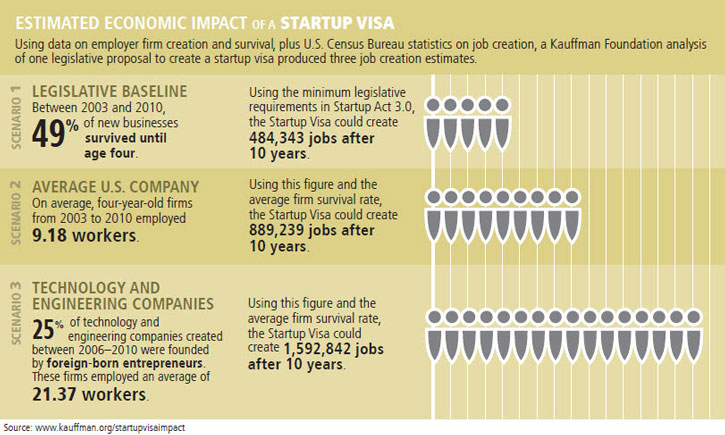A recent working paper published by Harvard economist, William R. Kerr, and Wellesley economist, Sari Pekkala Kerr, is making waves on the subject of immigrant entrepreneurship. The study asks: just how important are foreign-born entrepreneurs to our economy? Are their contributions truly significant?
The study’s abstract reads as follows:
We examine immigrant entrepreneurship and the survival and growth of immigrant-founded businesses over time relative to native-founded companies. Our work quantifies immigrant contributions to new firm creation in a wide variety of fields and using multiple definitions. While significant research effort has gone into understanding the economic impact of immigration into the United States, comprehensive data for quantifying immigrant entrepreneurship are difficult to assemble. We combine several restricted-access U.S. Census Bureau data sets to create a unique longitudinal data platform that covers 1992-2008 and many states. We describe differences in the types of businesses initially formed by immigrants and their medium-term growth patterns. We also consider the relationship of these outcomes to the immigrants’ age at arrival to the United States.
The study is important because it forces members of Congress to conduct a cost-benefit analysis, in order to determine whether or not it is beneficial for the United States to create more opportunities for highly-skilled entrepreneurs and professionals. Regrettably, the immigration debate has largely centered around illegal immigration to the United States, ignoring calls to create more flexibility for highly-skilled immigrants and immigrant entrepreneurs. As it stands today, immigrant entrepreneurs can only obtain a green card via sponsorship from a United States employer. The majority of entrepreneurs are forced to remain in the United States on a temporary ‘dual intent’ nonimmigrant visa, until a U.S. employer agrees to sponsor their green card. Visa options are very limited for highly-skilled immigrants. Even for the most brilliant of entrepreneurs, this process requires time and patience. Our current immigration laws are doing us a disservice since they are keeping out some of the most talented entrepreneurs in the world. Immigrant entrepreneurs are increasingly important because the number of businesses and American jobs they create is on the rise.
Here are some of the study’s findings:
- As of 2008, at least one in four entrepreneurs among start-up companies are foreign-born. Similarly, at least one in four employees among new firms are foreign-born
- 37% of new firms had at least one immigrant entrepreneur working for the company
- At least 1 in 3 start-up firms were founded by an immigrant entrepreneur, with an increasing rate from 1995-2008
- The share of immigrants among all employees working for start-up companies is on the rise
- Immigrant employees in low-tech positions comprise about 22.2% of start-up companies, while 21.2% of immigrants work in high-tech positions in start-up companies
- Among new start-ups backed by venture capitalists, 60% had at least one immigrant entrepreneur
- Immigrant employees working for a start-up company backed by venture capitalists have higher mean average quarterly earnings
Additionally, according to the Kauffman Foundation:
- In 2012, immigrants were nearly twice as likely to start businesses as native-born Americans
- In 2014 28.5% of new entrepreneurs were immigrants, a 13.3% increase since 1997.
- From 2006-2012 one-quarter of new engineering and technology companies in the United States had at least one immigrant key founder
- In 2012 Engineering and technology firms started by immigrants employed approximately 560,000 workers, generating $63 billion in sales
- In 2011 24 of the top 50 venture-backed startup companies had at least one immigrant founder
- On average, immigrant founds of top venture-backed startup companies have created 150 jobs per company.
The Kerr study found that overall there is a lack of research on the contributions of immigrant entrepreneurs. Due to this lack of research, the economists used restricted-access data sets from the U.S. Census Bureau to reach these outcomes. In this study, entrepreneurs were defined as those “who founded a firm within the last three years of a given time period, and were a top initial earner.” Although the majority of startups created by immigrant entrepreneurs fails within the first six years, the United States is increasingly dependent on foreign entrepreneurs. The need for a startup visa cannot be more important at a time when demand for engineering and technology firms is at an all-time high. It is no secret that immigrants have had a long history of starting and maintaining successful business in the United States, some of which have grown to become Fortune 500 companies, while others have become iconic. In fact, the Kauffman Foundation estimates that in 2010 more than 40% of Fortune 500 companies were founded by an immigrant or child of an immigrant. Despite these contributions, U.S. Congress has not created an immigrant visa designed specifically for the entrepreneur of the 21st century. That is why entrepreneurs like Mark Zuckerberg have backed FWD.us a pro-immigration reform initiative founded by leaders in the technology community, to create employment opportunities for immigrant entrepreneurs all over the world. At the Law Offices of Jacob J. Sapochnick, we have helped thousands of foreign entrepreneurs achieve their dreams by helping them immigrate to the United States, and launch new startup companies. We are proud to support immigrant entrepreneurs.
For more information on visa options for entrepreneurs please click here. For a free legal consultation please contact our office.
 Visa Lawyer Blog
Visa Lawyer Blog



